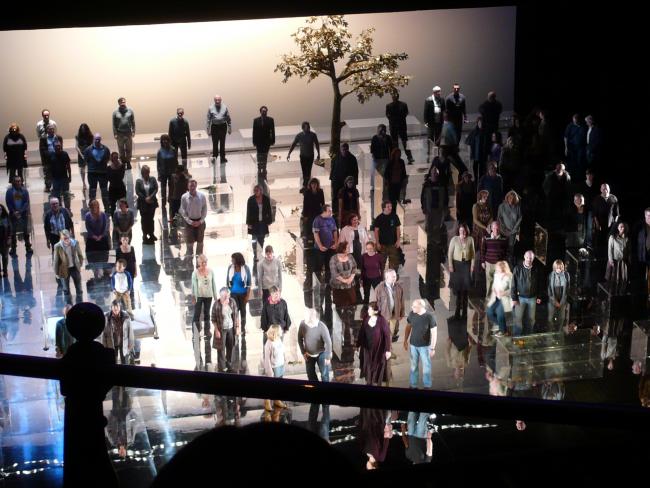31 January 2024

Musicians and chorus singers at English National Opera (ENO) have suspended their planned strike action which was due to begin on 1 February. ENO management has made an improved offer which unions are considering.
Equity, representing chorus members, has reached an interim settlement. It is confident of achieving full resolution in the coming weeks. The Musicians’ Union (MU) needs further negotiations to reach a settlement acceptable to its members. It has suspended strikes, while urgent talks take place but continues with action short of a strike.
Under threat
The future of the ENO has been under threat since Arts Council England (ACE) withdrew all funding in its 2022 forward funding allocation. Instead ENO has a small amount of transitional funding, so long as it leaves its base at the London Coliseum for the north of England.
Despite the uncertainty over their future, the ENO artists have refused to accept worse conditions and pay cuts on top of the enforced move. Members of both unions had voted to strike from 1 February, affecting performances of Paul Ruders’ The Handmaid’s Tale. They also planned to take action short of a strike from 30 January.
‘ENO artists have refused to accept worse conditions and pay cuts.’
They faced a change to contracts running only six months a year, a 40 per cent cut in earnings and redundancies for 19 of the 69 musicians in the orchestra and 4 of the 40 singers in the chorus. The vote was overwhelming in both unions – all the Equity members voted to strike and backed other action. And MU members voted 93 per cent for striking and 98 per cent for action short of a strike.
“Managed decline”
Last October the ENO’s musical director Martyn Brabbins, popular with both audiences and musicians, resigned in protest against what he described as “managed decline”. Back in 2015 the Arts Council had cut the ENO’s grant from £17 million to £12 million, little more than the level of grant of twenty years before. Since then things have become even worse.
In 2022 the ENO’s continued existence was called into question. As part of the Conservative government’s “levelling-up” programme, the then culture secretary, Nadine Dorries, had ordered that London arts funding be cut by £24 million a year.
No grant
Nicholas Serota, chair of Arts Council England, told the ENO that its annual £12 million grant would disappear; it would have only limited transitional funding. Other opera companies – Welsh National Opera, Glyndebourne and the Royal Opera House – also suffered cuts, but none were threatened as the ENO was.
There was a partial reprieve after a public outcry. The ENO was given till 2029 to find a new base outside London. The ENO will only mount London productions for five months of the year, hence the six month contracts for artists.
Few details
In December, the ENO announced that it would re-locate to Greater Manchester. But there are few details – in particular where it will perform and rehearse as well as store sets and costumes – all essential facilities. This may be just a further step in the managed dismantling of the ENO.
Equity warned that the announcement about ENO Manchester left the ENO’s workers still at risk without significant investment. It called for a workforce plan to manage their continued engagement. And the move also raises questions over the future of Opera North. Based in Leeds and performing across the north of England, it was originally founded as ENO North in 1977.
